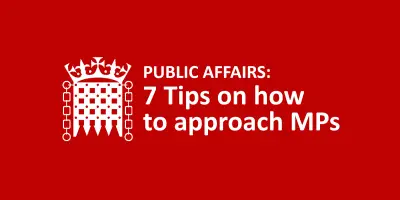The public affairs world can seem very glamorous. Whilst there’s no denying the great events that happen and the opportunity to meet some political heavyweights, and work on some really interesting issues – behind the scenes, a successful public affairs campaign always requires a backbreaking amount of comms work to ensure MPs not only become aware of your issue, but actually become advocates for your cause.
I’ve been lucky enough to work on the successful Boost Bingo and Scrap the Tax on Family Flights campaigns – incidentally, they both secured sizeable tax cuts – one for the bingo industry and the other for families travelling with children. So although they focused on very different issues, there were many similarities in the campaign approach – as there is indeed for public affairs campaigns generally. For one, public affairs campaigns (almost always) need to gain support from both a small number of parliamentary champions and a larger number of MPs that will back your call. The way to communicate your campaign to the latter group will invariably include sending hundreds (up to 650 of course) emails a few times over. Below are some tips on how to make this time intensive task as successful as possible:
1. Tailor your emails
It’s always tempting to write a nice, generic template campaign email. If relevant and interesting, your issue should get a few MPs on board. However, only by taking the time to research MP’s individual interests and previous involvement in the issue will you engage the numbers that you need. Find out why an MP should care – is the issue particularly affecting their constituency? Are they a fan of the activity or the industry? Have they spoken about this or a similar issue in Parliament? There will still be some MPs who you can only approach in generic terms, but when possible, a really great intro as to why it’s relevant to them specifically will do wonders.
2. Remember the gatekeepers
Most MPs don’t check their emails, their researchers do. This relates to point 1 – if you tell them why the MP is likely to care, then the researcher will feel more inclined to flag the issue to their MP. More generally, make sure your email clearly explains who you are and what your ask is – so that researchers can relay the message with ease – if it’s unclear, they may just not bother.
3. Keep it short and simple
I find this tough. You have a million things you need to say to really explain your campaign: why it matters, who backs it, the research you have conducted, etc. But nothing is more off-putting for a researcher or MP than paragraphs upon paragraphs of text. Keep it short and to the point. Then attach briefings and documents and War and Peace if you like. If there is interest in the campaign, the attachments will be read.
4. Spell out your asks
The key to success is mobilising supportive MPs – don’t just brief them on the issue. Make it easy for them and give them 3-4 options as to how they can show their support. For example – send them a link to an Early Day Motion they could sign (always a great way of flush out supporters), provide them with a press release and offer to sell it in on their behalf, draft some template Parliamentary Questions they may wish to table, give them a nice banner for their website.
5. Line up your champions
General support is crucial, but so is having a really great, supportive MP that will champion your cause. Not only will this help with securing positive press on the issue, but it provides you with someone that will continue pressing the issue in parliament. The Boost Bingo and A Fair Tax on Flying campaigns were successful in great part because strong parliamentary champions really cared about the issue and worked hard to foster support for the causes in Westminster.
6. Follow up with a call
Time consuming, yes, but a follow up call to discuss your email will do wonders – especially if you focus on a targeted number of MPs that through research you know are likely to care about the issue. Be ready to point a researcher to the date and time the email was sent – and also have the email ready to be resent! Just don’t hound them down.
7. Say “thank you”
MPs and those that work for them have very busy days, receive hundreds of emails and are pulled in countless directions. If an MP has been supportive of your campaign, take the time to say thank you. A handwritten card, a public list of acknowledgements on your campaign website, a message from the campaign’s Twitter account or Facebook page – take the time to thank your supporters. You don’t know when you will be needing them again.




